Academics, Hope, and Gratitude
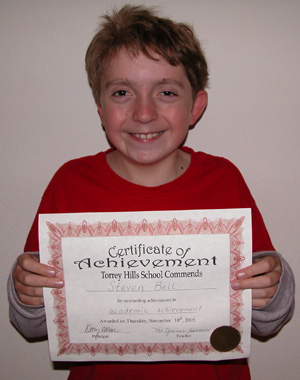
We could never learn to be brave and patient, if there were only joy in the world.
- Helen Keller
In this life we cannot do great things. We can only do small things with great love.
- Mother Teresa
Radiation to the developing brain of a child has the potential for devastating longterm side effects. A recent study done at St. Jude confirms what we already know, whole-brain radiation damages kid's brains, and it's an ongoing process.
Steven has a gentle and compassionate nature, intelligent, self-motivated and naturally inclined toward learning and academics. With all the physical difficulties he's experienced since birth, he isn't and never will be an athlete, but scholarly pursuits grabbed his interest and seemed completely within his reach.
A little over six years ago we moved into a school district filled with the high-achieving children of affluent overachieving professional parents. At that time it seemed like the right thing to do. Steven thrived in the classroom, and loved school, was at the top of his class.
The night before Steven's MRI, I'd signed up to be the room mother for his third grade class and co-room mom for Sean's first grade class. I was helping Steven with his homework. Life was good.
Two days later Steven is in the hospital recovering from brain surgery and we're talking to doctors.
"They got it all, but it's a high grade malignant tumor and without whole brain radiation it's almost a guarantee he won't survive."
"I.Q. losses of 15-20 points or more over 10 years, the smarter kids have higher losses, girls suffer fewer effects than boys..."
"If you want to have a chance of having a child in your home five years from now, you need to consider radiation."
"The chances are he'll be able to live independently as an adult. I even have one patient who went to Berkeley, but she was 15 when she had radiation."
Only a chance? One patient? The chances are...?
The future is uncertain, take nothing for granted, this was our wakeup call.
During our months at St. Jude, we were overwhelmed just trying to to move from one hour to the next, one day to the next, one treatment to the next that we put everything else on hold, there was no other way to survive.
As Steven approached the end of treatment, we were faced with, among other things, his return to school. About a month before we drove home, I emailed Steven's third grade teacher and told her that I was torn completely between assuming he'd be a longterm survivor and plunking him back in school to pick up the pieces and keeping him home, not pressuring him and just enjoying what time we had together.
A good friend of mine lost her son 9 year old son to a brain tumor 5 years ago this month. During Steven's treatment, she gave me a piece of advice that has stayed with me. She told me that if she had one thing to do over with her son, it would be that she wouldn't have worried so much about his school.
I try not to. His teacher promised me no pressure. So he came back to third grade for 4 weeks, battle-scarred, no body hair at all, thin and weak, after having spent the bulk of the school year in Memphis throwing up and fighting for his life.
He grew stronger over the summer, and in the fall, after many discussions with many people, and against the advice of his oncologist, we put him into fourth grade. My reasoning was that it was what Steven wanted and for me, the main reason I was putting him back into school at all was for social reasons, and to keep him back would have separated him from his peer group.
Fourth grade in his school is generally recognized as being difficult, even for students without as many hits against them as Steven.
And poor Steven was drowning, working as hard as he could to barely keep his head above water.
From the top of his class to just barely making it. He was spending three hours a day and more on homework, weekends as well, and still falling behind. We were questioning our decisions, and things that had previously seemed important, like being in a high-performing school, now seemed like the wrong thing for poor Steven.
Much of the problem wasn't his intellect, but his inability to concentrate, distraction was always a problem but last year it had gotten to an entirely new level and his inability to concentrate was affecting our entire family. I would have to sit next to him the entire time he was working on his writing projects or nothing would get done.
The inability to concentrate is a textbook late effect of radiation, along with reduced processing speed. His teachers and others that had worked with him before his diagnosis all noticed the difference.
Steven's oncologist told me about a double-blind study performed at St. Jude and published last year, where methylphenidate (ritalin) was used to treat attention and processing speed deficits in leukemia and brain tumor patients who had received radiation to the brain.
He referred Steven to a neurologist at St. Jude, who prescribed a trial of ritalin for him in August. I have always been opposed to such medications, believing that they are way overused as an easy way to control overenergetic boys. But we'd tried everything his teachers and we had come up with, to no avail.
Desperate times call for desperate measures, and we started him on the medication when school started this last September.
I didn't tell anyone at the school that he'd started ritalin, mostly because I was sending his lunchtime dose to school with him in his lunch sack, and the school (and California law) frown on sending controlled substances to school with minor children. I'd started to try and get the proper paperwork in place so the nurse could give it to him, but the red tape involved with getting the signature of a local doctor on the forms when a local doctor hadn't prescribed the drug overwhelmed me and I finally gave up and decided to go the convenient (albeit illegal) route of putting his daily medication in his lunch.
Steven is the antithesis of a hyperactive child and as far as Doug and I can see, the medication doesn't seem to affect him one way or the the other. It also seems like he has less homework this year, but we do notice that he's doing a much better job of getting the homework he has done in a timely fashion.
When we went in for Steven's IEP early last November, I hadn't seen any of his evaluations. The resource specialist, his teacher, the psychologist, and his speech therapist all commented on him having a much easier time this year than last. His speech therapist was surmising that it was due to healing of the damage in his brain.
The resource specialist decided she didn't need to pull him out of class any more and we agreed. His evaluations were good, improved over his scores from last year.
Then the shocker (for us): His teacher said she wanted to place him in a group for gifted math students, but she wanted to ask us first because she knew of his struggles last year and didn't want to add to his workload and stress level.
Doug and I were blown away. It was only at the end of the meeting, when we were signing all the state forms, I told them about the medication. Thank God they didn't ask about the dosing or form of ritalin he'd been taking or I'd have been forced to come clean about our conspiracy to bring controlled substances onto the school campus.
We have no idea how much or how little a role the medication is playing in Steven's recent successes, but for now, it doesn't matter. At our November visit the neurologist at St. Jude prescribed him a time release dose that we give him once in the morning at home, so we're on the right side of the law now.
About a week after the IEP meeting, Steven came home with an Academic Achievement award, there was one given out to each grade and Steven was chosen out of 75 fifth graders.
I.Q. losses of 15-20 points...
Mom, I want to teach paleontology when I grow up.
The chances are he'll be able to live independently...
One patient went to college...
Mom, I got an award!
Just a little piece of paper, nothing more...
To us it represents the resurrection of a hope we thought we'd lost, the hope that maybe Steven still has a fighting chance to excel and compete in a competitive world. Maybe, just maybe...
Steven's brain tumor diagnosis has changed the entire focus of our lives. Academic success and achievement are still important to us, but we've adjusted our expectations and we're learning that the greatest successes are sometimes measured by the smallest things.
Whatever the eventual outcome, we are filled with gratitude for the moment and we deeply cherish the gift we've been given in our kids.
Here's hoping the New Year brings blessings for all of us.
- Kathleen
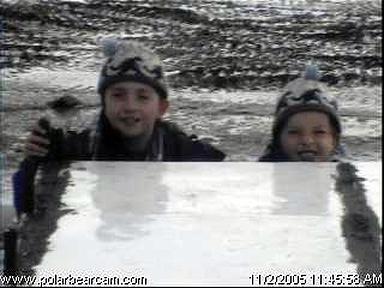






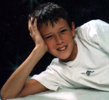

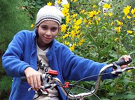















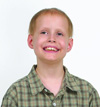










1 Comments:
Dear Steven, I hope you continue to do well. You are in my thoughts and my prayers. I am so proud of you for doing so well in school. You can do anything that you want to do! XOXOXO love and prayers,
Debbie
Post a Comment
<< Home